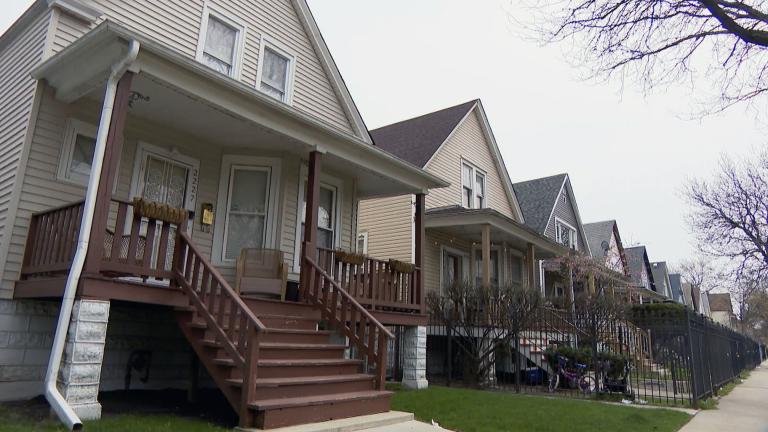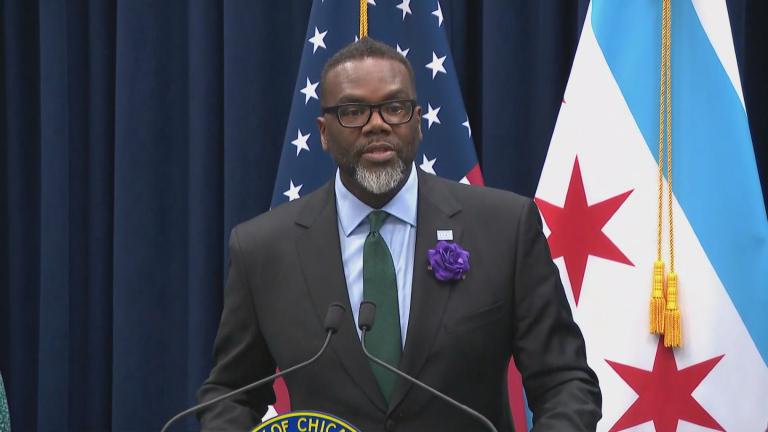Chicagoans won’t have to pony up in 2024 to cover the cost of a city-imposed property tax hike to keep up with inflation, or any new fees.
Mayor Brandon Johnson’s first budget, which took effect Monday, includes no new taxes, fees or service cuts, which ensured it passed in November with the overwhelming support of the Chicago City Council.
But eliminating a $538 million shortfall while carving out enough to make new investments in mental health services and environmental justice may have been the easy part.
Johnson now must make good on his promises to use the city’s $16.7 billion spending plan as a down payment on investments in working-class Chicagoans and start transforming the Chicago Police Department into an agency better prepared to take a new approach to public safety.
At the same time, the humanitarian crisis posed by the arrival of thousands of migrants sent to Chicago from the country’s southern border is once again escalating, with Texas Gov. Greg Abbott sending at least 15 buses to Chicago last Wednesday alone, according to city records.
The city’s 2024 spending plan sets aside just $150 million to house, feed and care for the men, women and children sent to Chicago from the southern border — less than half of what city officials expected to spend in 2023 to care for the migrants who arrived in Chicago after fleeing political instability and economic collapse before requesting asylum.
There were approximately 14,700 people in city shelters, with approximately 350 people waiting at O’Hare International Airport, the police station in Pilsen and at the area designated for buses from Texas to drop off the migrants while waiting for a bed as of Friday morning, according to city data.
Despite Johnson’s pleas for more help from the state and federal officials, the crisis appears to be entering a new, more chaotic phase, with border crossings rising to record highs and Abbott vowing to defy new city rules governing where and when buses arriving from Texas can drop off migrants in Chicago.
New Spending Set
Johnson’s spending plan earmarks $5 million to create a new office designed to help those returning to Chicago from jail or prison find jobs or other assistance as they work to rebuild their lives. In addition, the budget includes $500,000 for a new panel that will study whether and how the city should pay reparations to Chicagoans who are the descendants of enslaved African Americans.
In addition, the city also plans to double the number of social workers, addiction specialists and counselors working to respond to 911 calls for help from people experiencing mental health crises and to open two new mental health clinics in facilities already operated by the Chicago Department of Public Health.
That alternate-response program, launched by former Mayor Lori Lightfoot as a pilot program, will become a permanent part of the city’s approach to those in crisis starting in 2024.
Those proposals are the core of the plan known as “Treatment Not Trauma,” which Johnson pledged to implement if elected mayor. In all, the city will spend $4.8 million more this year on mental health services.
Johnson’s first budget will also expand the city’s youth jobs program by 4,000 positions to 28,000 jobs, according to the proposal. More than 46,000 teens and young adults applied for the city’s summer jobs program in 2023, according to city records.
In addition, the spending plan includes an additional $10 million for the city’s program that offers grants to low-income homeowners to make needed repairs.
The spending plan calls for an additional $6.8 million for the city’s shelter system, which has been strained to the breaking point by the arrival of the migrants in Chicago, all of whom entered the country legally after requesting asylum.
Public Safety Transformation Set
The city’s 2024 budget is also designed to start the process of transforming the Chicago Police Department into an agency better prepared to implement the more “holistic” approach to public safety that focuses on the “root causes” of crime, as the mayor promised during the campaign.
Johnson’s plan makes 398 of the department’s more than 11,700 sworn positions into jobs open to civilians, who would not have law enforcement powers.
CPD is also set to add training officers and see its fleet of vehicles expanded to accommodate the nearly 200 new detectives Johnson has promised to promote.
In addition, Johnson has proposed expanding the size of the Office of Constitutional Policing and Reform by 45 positions and boosting its budget by approximately 18% to $582 million, according to his spending plan.
The city is in full compliance with approximately 6% of the 4-year-old court order, known as a consent decree, according to the team appointed by a federal judge to monitor the city’s progress.
The overall budget for the Police Department is set to rise from $1.94 billion in 2023 to $1.99 billion in 2024. The recently approved contract extension with the city’s largest police union will add to that bill in coming years.
Department of Environment Returns
2024 also marks the return of the Department of the Environment, as part of a renewed emphasis on environmental justice that would fulfill a key campaign promise made by Johnson.
Former Mayor Rahm Emanuel disbanded the department in 2012, and Lightfoot did not make good on promises to bring it back.
Johnson also reversed Lightfoot’s 2019 decision to combine the departments of Innovation and Technology and Fleet and Facility Management. In 2024, the department known as 2FM will return, and a new department of Technology and Innovation will launch.
Pension Costs Continue to Grow
The city’s finances will continue to be pinched by soaring pension payments, as the city complies with a state law that requires two of Chicago’s funds be funded at a 90% level by 2055 and the other two by 2058, ensuring they can pay benefits to employees as they retire.
In 2024, state law requires Chicago to pay more than $2.41 billion to its pension funds. Johnson also proposed making an additional payment to the city’s four pension funds of $306.6 million, following a policy put in place by Lightfoot, to prevent “further growth of the city’s unfunded pension liabilities,” according to the Johnson administration.
Contact Heather Cherone: @HeatherCherone | (773) 569-1863 | [email protected]






